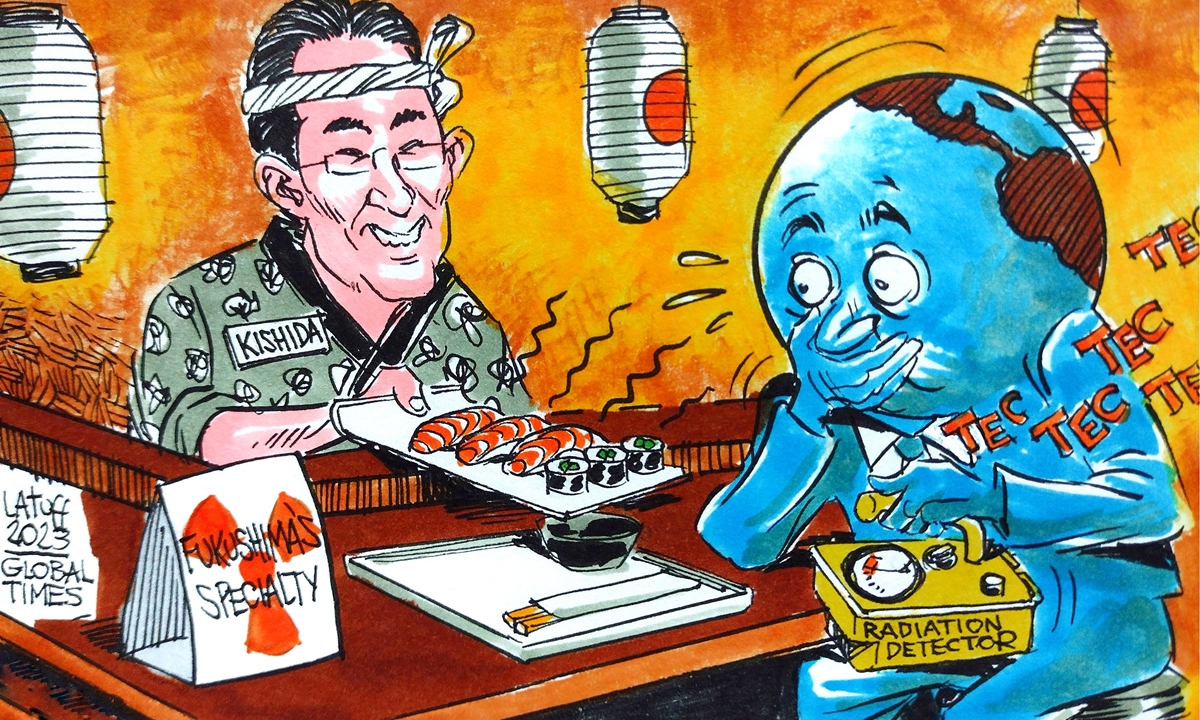
Japan serves special dish. Illustration: Carlos Latuff/Brazil
While Japanese Prime Minister Fumio Kishida embarked on a trip to Southeast Asia, which is widely seen as a publicity stunt to play down the hazardous dumping of Fukushima nuclear-contaminated wastewater into the ocean, China urged Japan on Wednesday to faithfully fulfill its international obligations and face the concerns of the international community by making a sincere statement based on science.
During the 26th ASEAN Plus Three Summit, Premier Li Qiang clarified China's position on Japan's dumping of the nuclear-contaminated water.
Li stated that the treatment of nuclear-contaminated water concerns the global marine ecosystem and public health. Japan should faithfully fulfill its international obligations, consult fully with neighboring countries and other stakeholders, and handle the nuclear-contaminated water in a responsible manner.
During the ASEAN meetings, Kishida planned to explain "how the safety of the water has been ensured" based on an International Atomic Energy Agency (IAEA) report, and will continue to "urge China toward a scientific discussion on the issue that involves experts," Japanese media outlet Nikkei reported on Wednesday.
"We noted in the media reports that Japan said it would explain during the meetings to other countries the discharge," Mao Ning, spokesperson of the Chinese Foreign Ministry, said at a press conference on Wednesday.
We hope Japan will face up to international concerns and explain its position with sincerity and a science-based attitude, which will gain the international community's faith, rather than continue to downplay or veil the harm of the discharge, Mao said.
Japan coined the term "treated water" and keeps telling the world that the concentration of tritium is up to standard in order to create an impression that tritium is the only radioactive substance in the nuclear-contaminated water, and since the concentration of tritium is up to standard, the nuclear-contaminated water is harmless, the spokesperson said. "But this narrative can hardly deceive the international community."
Some experts believe that the ASEAN nations have not made a strong reaction to Japan's nuclear-contaminated water dumping as the impact on them won't be significant in the short term due to ocean currents
"Also, those countries may not realize that the nuclear-contaminated ballast water from Japan could affect ASEAN ports," Chang Yen-chiang, director of the Yellow Sea and Bohai Sea Research Institute of Dalian Maritime University, told the Global Times on Wednesday.
As most ASEAN countries rely on the shipping business to maintain their trade, how much ballast water could be nuclear-contaminated water from Japan that flows into the territories of ASEAN countries "is something to be considered," Chang said, noting that this is also part of the reason why Kishida needs to give an explanation during the ASEAN meetings.
As Kishida tried to lobby around at the multilateral platform, Japanese media reported that "China has rejected Japan's proposal that it join an international verification framework for assessing the results of radiation level" monitoring of the nuclear-contaminated water dumped into the sea.
"Beijing has also ignored Tokyo's repeated proposals for a science-based dialogue involving experts on the matter," Kyodo News said, citing unnamed Japanese officials
Japan uses the IAEA as a "shield," saying that the participation of other countries in monitoring must be under the IAEA framework and through the consent of the IAEA. However, there are no other countries or international organizations participating in the IAEA monitoring framework, which is not real international monitoring, and there is a serious lack of transparency, Wu Jianghao, Chinese ambassador to Japan, said recently.
If Japan has sufficient confidence in safety, it should actively support the establishment of international arrangements for long-term monitoring with full and effective participation of all stakeholders, including third-party monitoring independently implemented by other countries, Wu said.
In fact, Chinese public environmental database, the Blue Map App,
started to provide global nuclear radiation data from September 1 in order to increase public access to relevant data amid growing concerns over the impact of the Japanese government's reckless dumping.
The app developer told the Global Times that the Tokyo Electric Power Company (TEPCO) and the Japanese government should guarantee comprehensive, timely and complete publishing of dumping data.
Chinese experts have also called for efforts to study
whether it is possible to prosecute those responsible for the reckless plan to dump the wastewater into the ocean, according to a recent report by Chinese think tank Global Governance Institution.
As a matter of fact, the Fukushima radioactive water contains a complex range of elements. Even after purification, the water will still contain dozens of radionuclides such as carbon-14, cobalt-60, strontium-90, iodine-129 and caesium-137, Mao told the press conference.
No matter what name Japan gives to the water, these radionuclides will not just disappear by themselves. This is a fact that Japan needs to face, she said.




